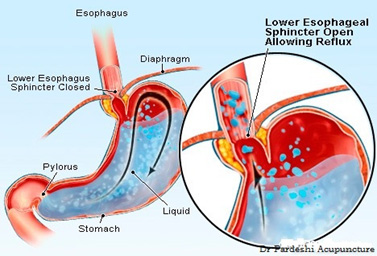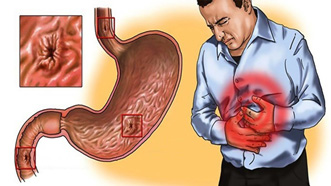
GERD (Gastroesophageal reflux disease) is a chronic digestive disorder characterized by the reflux (backflow) of stomach contents into the esophagus. The esophagus is the tube that connects the mouth to the stomach. GERD occurs when the lower esophageal sphincter (LES), a muscular ring at the base of the esophagus that normally prevents stomach contents from flowing back up into the esophagus, is weak or relaxes at inappropriate times. This allows stomach acid and other digestive juices to flow back into the esophagus, causing irritation and inflammation, heartburn acid reflux.
The most common symptom of GERD is heartburn, which is a burning sensation in the chest that may spread to the throat, neck, and jaw. Other symptoms of GERD disease include regurgitation (the backflow of stomach contents into the mouth), difficulty swallowing, and chest pain. Sore throat due to acid reflux is a common symptom of GERD.
 Acid reflux cough, also known as GERD cough, is a cough caused by acid reflux, which occurs when stomach acid and other digestive juices flow back into the esophagus and irritate its lining. The acid can also travel up into the throat and cause irritation and inflammation, resulting in a cough. GERD cough symptoms may disturb sleep due to aspiration of gastric contents.
Acid reflux cough, also known as GERD cough, is a cough caused by acid reflux, which occurs when stomach acid and other digestive juices flow back into the esophagus and irritate its lining. The acid can also travel up into the throat and cause irritation and inflammation, resulting in a cough. GERD cough symptoms may disturb sleep due to aspiration of gastric contents.
Acid reflux at night, also known as nocturnal reflux, is a common problem that can disrupt sleep and cause other complications. It occurs when stomach acid and other digestive juices flow back into the esophagus while lying down, and can cause heartburn, coughing, and other symptoms. Acid reflux vomiting occurs when the stomach contents, including stomach acid, bile, and undigested food, flow back up into the esophagus and sometimes into the mouth. Vomiting due to acid reflux can be a result of severe reflux or a complication of GERD.
Pregnancy can increase the risk of acid reflux for several reasons. As the uterus expands, it can push on the stomach and cause stomach contents to flow back up into the esophagus resulting in heartburn during pregnancy. The hormone progesterone, which is produced at high levels during pregnancy, can also relax the muscles that keep stomach acid in the stomach, further increasing the risk of heartburn in pregnancy. Acid reflux during pregnancy is a common complaint, affecting up to 80% of pregnant women.
Some severe GERD symptoms can significantly impact a person's quality of life and may include: difficulty swallowing (dysphagia), esophageal strictures, esophageal ulcers, and esophageal cancer.
The most common acid reflux cause is a weakened or malfunctioning lower esophageal sphincter (LES), a ring of muscle at the bottom of the esophagus that normally prevents stomach contents from flowing back up.
Eating large meals or lying down after eating is one of the important GERD causes and can increase the risk of acid reflux by allowing stomach acid to flow back up into the esophagus.
Certain foods and drinks, like chocolate, coffee, alcohol, and acidic or spicy foods, can trigger acid reflux.
Other factors that can contribute to acid reflux include: Hiatal hernia, obesity, smoking, pregnancy, certain medications, and some medical conditions
Several tests can be done to diagnose GERD. These tests can help determine the severity of the condition and identify any underlying complications. Some of the most common tests include: Endoscopy, pH monitoring, esophageal manometry, upper GI series, and ambulatory acid (pH) probe test
Here are some remedies that can help alleviate the discomfort of acid reflux sore throat: eat smaller instead have more frequent meals, stay upright after eating, and elevate the head of your bed. For acid reflux, and sore throat remedy, avoid trigger foods that can precipitate regurgitation. Drink plenty of water, use throat lozenges or gargle salt water, and chew gum as part of home remedies for reflux. Consider medication like over-the-counter antacids to reduce acid reflux symptoms and relieve throat irritation.
For a natural cure for acid reflux: Drink ginger tea, mixing a teaspoon of baking soda with water and drinking it can help neutralize stomach acid and assist get rid of acid reflux.
Gastroesophageal reflux disease treatment may include:
Besides home remedies, as stated above following medication can be used. There are many acid reflux medications commonly used to treat gastroesophageal reflux disease. Antacids, such as calcium carbonate and magnesium hydroxide as a reflux medication, neutralize stomach acid. The commonest acid reflux medicine, proton pump inhibitors (PPIs), such as omeprazole, esomeprazole, and lansoprazole, reduce the amount of acid in the stomach. GERD medications, and H2 receptor blockers, such as ranitidine and famotidine, also reduce acid production.
Dietary modifications may include eating smaller, more frequent meals throughout the day, avoiding lying down after eating, and staying hydrated by drinking plenty of water. GERD foods to avoid are trigger foods such as spicy or acidic foods, fatty or fried foods, chocolate, caffeine, and alcohol, and instead focus on low-acid, high-fiber foods such as whole grains, fruits, vegetables, lean proteins, and low-fat dairy products. Acid reflux foods to avoid as given above are an essential part of the diet and lifestyle.
If your symptoms persist or worsen, it is important to consult a GI specialist as there may be underlying medical conditions that need to be addressed.
Acupuncture can effectively alleviate patients' symptoms of GERD with good safety and is well-accepted by patients. The addition of acupuncture to a standard-dose PPI is more effective than doubling the PPI dose for controlling GERD-related symptoms in patients who do not respond to standard PPI therapy.
Gastroesophageal reflux disease (GERD) is a chronic condition that occurs when stomach acid flows back into the esophagus, causing a variety of symptoms such as heartburn, chest pain, difficulty swallowing, regurgitation of food or sour liquid, and a sensation of a lump in the throat.
The treatment for GERD typically involves a combination of lifestyle changes and medication. Lifestyle modifications may include dietary modifications to avoid trigger foods, weight loss, avoiding lying down after meals, and elevating the head of the bed while sleeping. Medications may include proton pump inhibitors (PPIs), H2 receptor blockers, and antacids to reduce stomach acid production and neutralize the acid.
In severe cases, surgery may be necessary to repair or strengthen the lower esophageal sphincter, which is the muscle that normally prevents acid from flowing back into the esophagus. It is important to consult a doctor if you experience frequent or severe GERD symptoms, as untreated GERD can lead to complications such as esophagitis, ulcers, and strictures.
Acidity or hyperacidity, also known as acid hypersecretion or gastric hyperacidity, is a condition in which the stomach produces too much acid. This excess acid can lead to a variety of symptoms. Acidity-causing burning sensation in the chest can be caused by several conditions, including acid reflux, also known as heartburn. Acidity and constant heartburn can be a sign of gastroesophageal reflux disease (GERD). Burning in the esophagus can also be a symptom of acid reflux, which occurs when stomach acid flows back into the esophagus, causing irritation and inflammation.

A sensation of indigestion and stomach pain can be caused by various factors such as overeating, consuming spicy or fatty foods, and stress, among others. Chest pain due to acidity occurs when stomach acid flows back into the esophagus. Stomach pain due to acidity, also known as dyspepsia, can be caused by excess stomach acid and can be managed with lifestyle changes, medication, and avoiding trigger foods.
Common causes of hyperacidity include stress, spicy and fatty foods, alcohol, caffeine, smoking, and certain medications such as nonsteroidal anti-inflammatory drugs (NSAIDs). Heartburn causes can also underlying medical conditions such as gastroesophageal reflux disease (GERD), peptic ulcer disease, and gastritis. Causes of indigestion can be large fatty and spicy meals.
Symptoms of acidity are a burning sensation in the chest or throat; regurgitation, nausea, belching, and bloating. Heartburn symptoms - chest pain, can be mistaken for heart attack or vice versa.
Home remedies for heartburn include avoiding trigger foods and drinks, eating smaller meals, staying upright after eating, drinking ginger tea, and using baking soda as a natural antacid. Consuming fennel seeds, drinking chamomile or peppermint tea, and using apple cider vinegar. Practicing relaxation techniques such as deep breathing and yoga can serve as home remedies for acidity and gas problems. There is no direct home remedy for back pain due to acidity, but addressing the acidity with remedies such as drinking aloe vera juice or using baking soda may help alleviate the back pain indirectly by reducing inflammation and pressure on the affected area. Natural remedies for indigestion include consuming ginger or peppermint tea, taking probiotics, avoiding trigger foods, chewing food thoroughly, and staying hydrated.
Hyperacidity treatment or heartburn treatment typically includes lifestyle changes such as avoiding trigger foods, medications such as antacids or proton pump inhibitors, and in severe cases, surgery to repair any damage to the esophagus or stomach. Indigestion remedies are avoiding trigger foods, eating smaller meals, and chewing food thoroughly. Indigestion treatment may need medications such as antacids, H2 blockers, or proton pump inhibitors, and in some cases, treating underlying conditions that may be causing indigestion.
Acidity medicines include H2 blockers and proton pump inhibitors which all work to reduce the amount of acid produced by the stomach. Tablets for gas and acidity are Ulgel or Gellucil which can neutralize stomach acid. Such acidity tablets can provide temporary but heartburn instant relief from acidity.
Some studies suggest that acupuncture may be a safe and effective treatment for GERD and other digestive issues. It may help modulate gut-brain communication, prevent inflammation, and support the microbiome.
Shatavari - 3 gm twice a day with milk.
Yashtimadhu - 3 gm twice a day with milk.
Amalaki (Indian gooseberry) - 3 gm twice a day with water.
Sunthi (dry ginger) - 1- 3 gm twice a day with water
- is used as an acidic stomach remedy in Ayurveda.